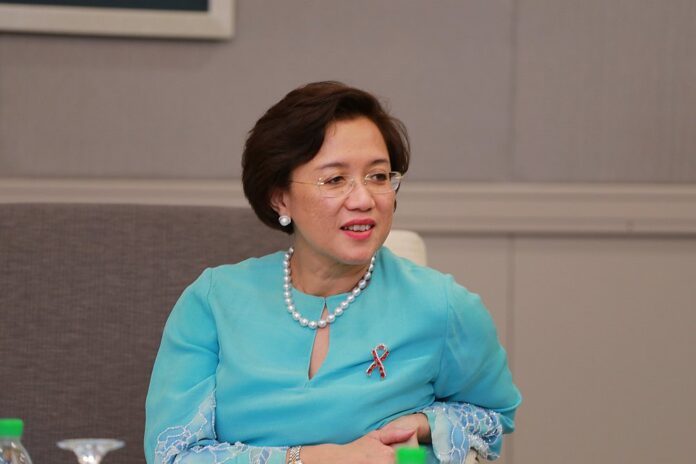Dr Adeeba said priority areas for investment include research and innovation in vaccine development for the HIV virus, progress towards an HIV cure, and evaluating models of service delivery that respond to diverse lived experiences. — Picture courtesy of Malaysian AIDS Foundation
KUALA LUMPUR, June 10 — Malaysia’s professor Datuk Dr Adeeba Kamarulzaman had earlier today addressed the United Nations General Assembly’s high-level meeting on HIV/AIDS, where she stressed the need for more funding and a science-based and evidence-driven approach for HIV responses.
In her capacity as International Aids Society (IAS) president, Dr Adeeba spoke virtually from Malaysia at 3am local time today at the event that took place at 3pm, June 9 at the United Nations Headquarters in New York.
A schedule of the programmes showed Adeeba as being slotted to be a panel discussing “Resources and funding for an effective AIDS response”, with the panel’s chair named as Ghana’s finance minister Ken Ofori-Atta, while other panelists were Congo’s vice health minister Dr Veronique Kilumba, Global Fund to Fight AIDS, Tuberculosis and Malaria executive director Peter Sands, and World Bank head of pandemic and heath security David Wilson.
The high-level UN meeting which Dr Adeeba spoke at is a three-day meeting from June 8 to June 10 (New York time) that intends to review the progress on commitments made over UN member states’ political declaration in 2016 towards ending the AIDS epidemic by 2030.
(As part of fast-track efforts towards the goal of ending the AIDS epidemic by 2030, targets for 2020 were previously set, including reducing the number of newly-infected with HIV persons from between 1.8 million to 2.4 million in 2015 to less than 500,000 persons in 2020, and reducing the number of people dying from AIDS-related illnesses from between 940,000 to 1.3 million in 2015 to less than 500,000 in 2020.)
Among other things, the UN had said the high-level meeting would provide recommendations to guide and monitor the HIV/AIDS response beyond 2021, including new concrete commitments to speed up action to end the AIDS epidemic by 2030, besides also promoting renewed commitment to speed up and implement a comprehensive universal and integrated response to HIV/AIDS.
In a copy of Dr Adeeba’s speech at the UN high-level meeting sighted by Malay Mail, she stressed that HIV remains a critical global priority, noting the toll the virus has taken in recent years: “Failing to reach any of the global 2020 targets led to an additional 3.2 million people acquiring HIV and the loss of an additional 1 million lives since 2015.”
Dr Adeeba said more funds needs to be invested to respond to HIV, noting that the Joint United Nations Programme on HIV/AIDS (UNAIDS) states that US$29 billion per year is needed for such responses in low-income and middle-income countries and that evidence shows that Asia Pacific will in 2025 need triple the amount of resources available in 2019 to respond to HIV.
She noted however that investment is smart and effective only if genuinely tailored to respond to diverse lived experiences, pointing out that social inequities continue to drive the HIV pandemic and focused investment is required to tackle societal enablers.
“The latest UNAIDS data show that the relative risk of HIV acquisition among female sex workers, gay and other men who have sex with men, transgender people and people who inject drugs is disproportionately high. In prisons and other closed settings, HIV prevalence is six times higher than in the general population,” she noted.
Having repeatedly stressed the importance of having evidence drive investments in the HIV response and the need for good data to be used in when making policies, Dr Adeeba said priority areas for investment include research and innovation in vaccine development for the HIV virus, progress towards an HIV cure, and evaluating models of service delivery that respond to diverse lived experiences.
Also to be prioritised for investment for the HIV response are prevention tailored to the needs of communities, evidence-informed efforts that will reduce stigma and mitigate the harmful effects of laws that punish and other structural barriers, and robust evidence including community-led research to inform policies, practices and innovations, she said.
While noting that it is commendable that low-income and middle-income countries’ domestic investments in HIV responses have grown by 50 per cent since 2010 and that donor support had increased by seven per cent, Dr Adeeba said “more is needed”.
At the same time, she indicated that funding alone would not be enough to tackle HIV, saying: “Investments will be wasted unless we remove criminalization and other laws and policies that fuel social inequities driving HIV transmission, delay or disallow access to services, and result in preventable hardship and death.”
“Governments cannot afford to pick and choose aspects of the Global AIDS Strategy, and cannot afford to under-invest, financially or politically. The bill for the HIV response will keep climbing if commitments, funding and action continue to fall short,” she said.
To find resources for the HIV fight, Dr Adeeba suggested supporting innovative domestic and global financing mechanisms, apart from other measures such as preventing new infections, implementing human rights-based policies that remove structural inequities driving ill-health, and improving efficiency with smart, evidence-informed programming. She later also stressed that scientists and community leaders must be an integral part of the policy-making process.
Adeeba is also chairman of the Malaysian Aids Foundation, and a professor of infectious diseases at Universiti Malaya.


